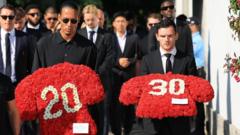Amid mourning for Edgar Lungu, a political feud with President Hakainde Hichilema escalates, leading to a contentious state funeral cancellation and deepening national divides over Lungu’s legacy.
Grief and Political Turmoil: Zambia's Divided Response to Edgar Lungu's Death

Grief and Political Turmoil: Zambia's Divided Response to Edgar Lungu's Death
The death of former Zambian President Edgar Lungu ignites deep-rooted political animosity with President Hakainde Hichilema, complicating funeral arrangements and national mourning.
The death of Edgar Lungu, Zambia's former president, has uncovered the bitter depths of political division within the nation, rending the mourning process deeply contentious. As tensions simmered before a state funeral that was set for last Sunday, it became clear that animosity lingered strongly between Lungu and the incumbent president, Hakainde Hichilema. So much so that Lungu’s family reportedly conveyed a dying wish from him: for Hichilema to remain absent from any involvement with his body.
Lungu, who passed on June 5, had been Hawaii’s head of state for six years until defeated by Hichilema in the 2021 elections—a significant political showdown marked by Lungu's alleged authoritarianism and Hichilema's call for reform. Initial expectations for unity following Lungu’s demise were dashed, evident from a video message by Lungu's daughter, Tasila, who emphasized the need for national unity while alluding to rifts that still festered. Lungu’s supporters, aggrieved by signs of disrespect from Hichilema, went without acknowledgment from the president during the critical hours after the announcement of Lungu’s death.
The history of their rivalry is rooted in significant grievances, particularly Lungu’s role in Hichilema’s unjust imprisonment in 2017 on treason charges. The pronounced hostility casts a long shadow over Zambia's political landscape, with Lungu's discontent surfacing even as his health waned. The announcement of his return to politics in October 2023 amid public dissatisfaction with Hichilema further exacerbated tensions, leading to complications such as restrictions placed on Lungu’s movements and subsequent withdrawal of his state benefits.
Following Lungu's passing, the complexities surrounding funeral arrangements painted a dismal portrait of Zambian politics, with government and family factions at odds over the final rites. Plans to honor Lungu through a state funeral dissipated amid accusations of betrayal from the family about government involvement, culminating in abrupt cancellations and a loss of national mourning.
Now, as arrangements for Lungu’s burial shift to South Africa, the hopes of many Zambians for a moment of closure and reconciliation fade, reflecting the significant scars that linger from this high-stakes political rivalry. In a nation where memories of the past govern the present, Edgar Lungu's death has not only rekindled grievances but has also deprived Zambians of the chance to collectively mourn. As the nation grapples with these turbulent events, the question lingers: can Zambia find a pathway toward healing amid such entrenched divisions?





















